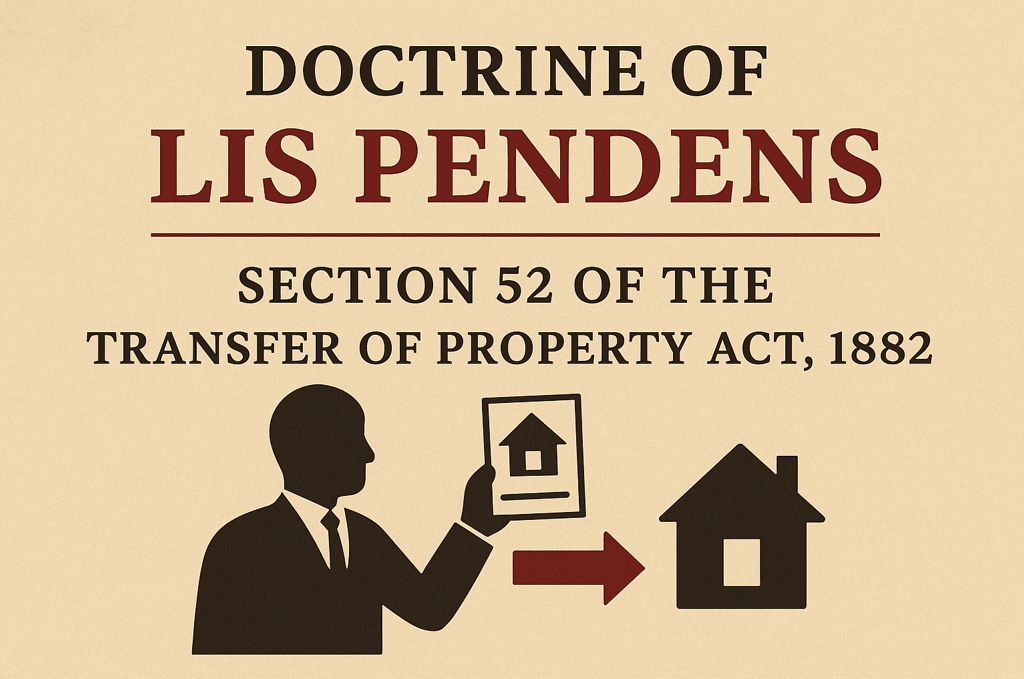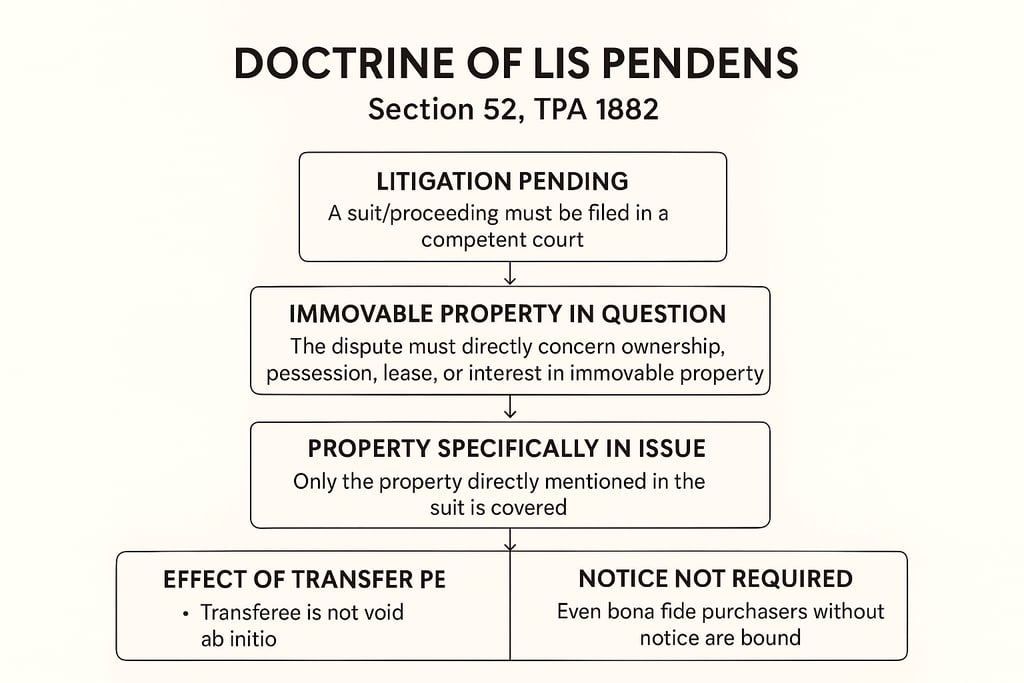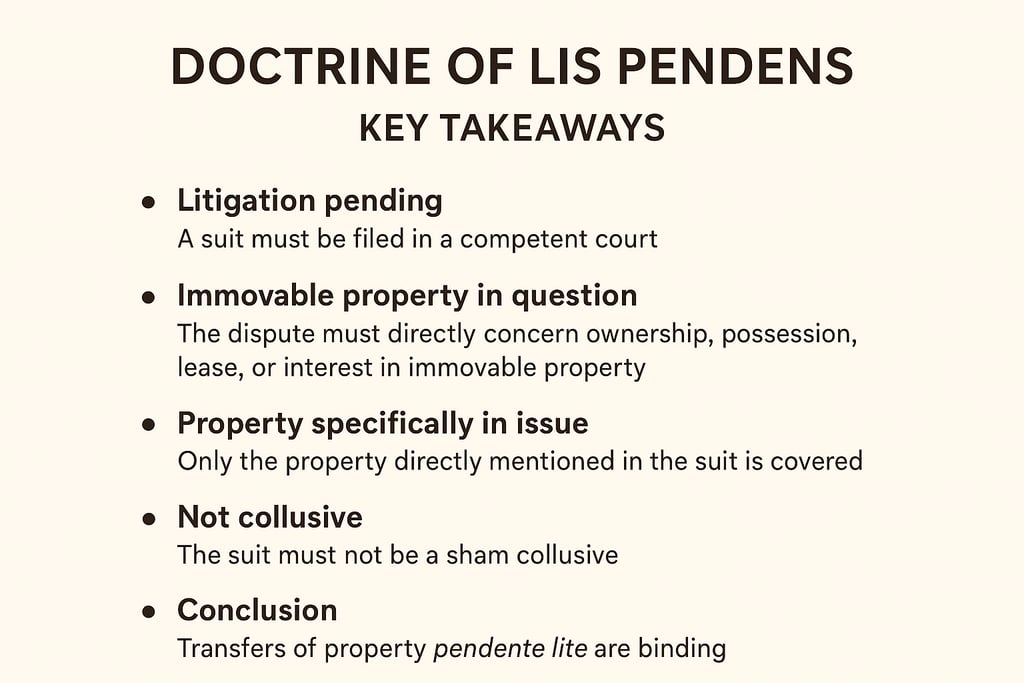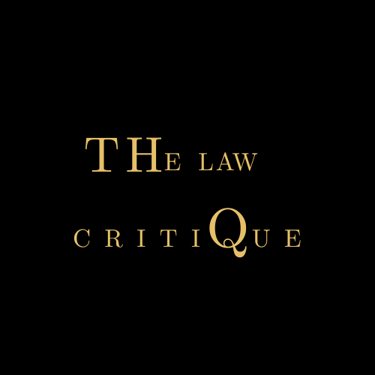Doctrine of Lis Pendens under Section 52 TPA, 1882 – Meaning, Scope & Case Laws
Understand the Doctrine of Lis Pendens under Section 52 of the Transfer of Property Act, 1882. Explore its meaning, essentials, legal effect, and landmark case laws with simplified explanations.
Author - THelawcritiQue
8/11/20256 min read


Doctrine of Lis Pendens – Section 52 of the Transfer of Property Act, 1882
What is "Lis Pendens under Section 52 of Transfer of Property Act, 1882.
Introduction
It is often seen in civil disputes that whenever a person had their title questioned in a dispute by another, he tries to dispose of their property to a 3rd party with an intention to safeguard their interests.
We regularly come across with situations where a defendant liable in a suit disposes of his assets to change title in the name of another - either to escape from the liability or to monetize the property and secrete his assets.
This actually strikes at the very purpose of the legal proceeding pending before the competent court of law defeating the legal rights of the one who initiated the proceeding.
Assume a situation where a party has no proper title to a property is being physical possession of the same. The actual person who had a rightful title in such property had instituted a suit against such illegal occupier for recovery of possession. Now the person taking advantage of being in physical possession, disposes of the property to another.
Such transfer during pendency of the suit of proceeding is known as "Transfer Pendente Lite" as provided under Section 52 of Transfer of Property Act. Section 52 provides that "any right to immoveable property is directly and specifically in question," in any suit in any competent court, such property cannot be transferred or otherwise dealt with that might affect the rights of the party.
The term Lis Pendens is derived from Latin, meaning “pending litigation”. It acts as a safeguard against the persons disabling them to create any rights in favour of any person that might effect the rights of the person who instituted the suit.
The prime importance of the doctrine is to see that the subject matter of the suit remains unaffected until the court’s decision. However for Section 52 of the Transfer of Property Act, 1882, to apply, the following essential ingredients need to be fulfilled..
Ingredients of Doctrine of Lis Pendens
Pending Litigation : The first ingredient is that there must be a suit or proceeding pending in a court of competent jurisdiction. That means unless a proceeding is filed in a court any subsidiary proceedings viz., pre-litigation cases, arbitration proceedings will not be considered to invoke this section.
In M/S Siddamsetty Infra Projects Pvt. Ltd vs Katta Sujatha Reddy (2024 INSC 861), the Supreme Court clarified that the doctrine kicks in wt the stage of 'institution of suit' and not at the stage when legal notice is issued.
The suit must be related to immovable property : Section 52 particularly speaks about the prohibition of transfer on immovable property. The section only applies where the rights in immovable property such as ownership, possession, lease, mortgage or any other legally recognized interest in property are directly in question.
The property must be specifically in issue : It is also not sufficient that the property is similar to that of the property in dispute or that based on same rights or cause of action. Section protects only the property on which a suit is filed.
Not being collusive : There should not be any collusion between the parties to the suit. The question of being collusive should be dealt with utmost care as many times parties may just file a suit only with an intention delay or defraud the just claims of a third person. Hence the parties must collude together in bringing up fractious suit.


Notice of the Litigation is Not Necessary
In cases involving Lis Pendens, the first strategy to contend for the defendants and the subsequent purchasers is that - they do not have notice about the pending litigation. This makes the purchaser subsequent to a suit filing a bonafide purchaser.
Though it is also a rule that rights of a bona fide purchaser need not be affected because of the transactions but at the same time the doctrine will not also let the vendor and vendee to a transfer pendente lite slip from the clutches of justice.
One of the important features of Section 52 is that the doctrine of Lis Pendens applies irrespective of whether the purchaser or even the seller had knowledge of the pending litigation or not.
In Usha Sinha v. Dina Ram (2008) 7 SCC 144, the Supreme Court held that "Lis pendens" itself is treated as constructive notice to a purchaser that he is bound by decree in the pending suit. Even a bona fide purchaser for value without having knowledge of pending litigation will be bound by the outcome of the suit.
Effect of Transfer Pendente Lite
While the transfer pendente lite will not confer absolute rights over the party who purchased, but the transfer itself is also not void ab initio. The doctrine of lis pendens makes the subsequent purchaser bound by the outcome of the decree in the pending litigation. That means if the suit is finally decreed in favour of the defendant the transfer becomes valid.
A transfer made during the pendency of litigation remains subject to the decision of the court. This means the transferee only steps into the shoes of the transferor and cannot claim rights higher than those of the transferor. If the suit is decreed against the transferor, the transferee is equally bound.
Case Reference: In Rajender Singh v. Santa Singh (AIR 1973 SC 2537), the Supreme Court observed that the doctrine does not annul the transfer but renders it subservient to the rights of the parties under the decree.
Exceptions to the Rule :
The doctrine of lis pendens is not absolute. Some exceptions include:
Transfers by operation of law : The doctrine shall not operate if the transfer is by due process in the case of succession, insolvency or a sale or transaction through court execution.
Cases where the property is not directly in issue but only incidentally connected.
Where the suit itself is collusive - Section 52 does not apply to sham or fraudulent proceedings.
Conclusion
The doctrine of lis pendens is a crucial in property law which safeguards the interests of plaintiff so as to not chase every subsequent transferee and making all the transactions subsequent to a litigation bound by the decree.
The doctrine also safeguards the subsequent purchaser by not rendering the transaction void ab initio. It balances the rights of litigating parties and protects the sanctity of judicial proceedings.
Ultimately, Section 52 ensures that the subject matter of the dispute remains intact until justice is served.
When a Gift is not Accepted it cannot confer any rights upon the donee. Read What confers valid acceptance to know about acceptance of a gift deed.


Key Takeaways (Doctrine of Lis Pendens)
Litigation must be pending: A suit/proceeding should be filed and should be pending before a competent court.
Immovable property involved: The dispute must directly concern interests in immovable property.
Property must be specifically in issue: Only the property directly mentioned in the suit is covered.
Suit must not be collusive: Doctrine does not apply to sham or collusive litigation.
Transfers pendente lite not void: Any transfers made during such pendency are valid but subject to the outcome of the suit.
Notice not required: Even bona fide purchasers without notice are bound by the doctrine.
Conclusion: The doctrine protects the integrity of judicial proceedings by preventing third-party interference during litigation.
FAQs on Lis Pendens
Q1. What does “lis pendens” mean?
Lis pendens is Latin for “pending litigation.” It prevents parties from transferring disputed property while litigation is ongoing.
Q2. Is a transfer during litigation void?
No, it’s not void ab initio. The transferee is bound by the court’s final decision.
Q3. Does the buyer need to have notice of the suit?
No. Even bona fide purchasers without notice are bound by the outcome of the litigation.
Q4. When does lis pendens apply?
From the filing of the suit in a competent court until its final disposal (including appeals).
Q5. Can parties transfer property with court permission?
Yes. If the court expressly allows, property can be transferred despite the pending litigation.
Q6. What is the object of Section 52, TPA 1882?
To maintain the status quo of property rights during litigation and prevent third-party complications.
Note : This article is researched, created and published by the Author, THelawcritiQue. The content is prepared by referring to statutory provisions and judicial precedents for academic discussion and general legal awareness as applicable in India. While due care has been taken to ensure accuracy, the information provided does not constitute legal advice.
Connect With Us Through
Connect with us
© 2025. All rights reserved.
